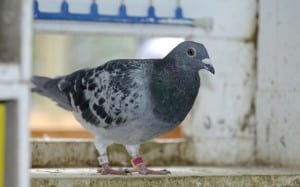 When I came back to India after a long time and started living in Mumbai, I developed mild wheezing; I dismissed it as my reaction to pollution. Then one day I went up to the terrace of my building and was shocked to see two enormous trays filled with grains mixed with sev (fried stuff made from basan and spices). Birds, especially the friendly neighborhood pigeons and crows feasted on it and the entire floor of the terrace was covered with their droppings. It is at that point I realised that why so many pigeons come to rest near my windows, especially on the base of window grills that project out to give a feeling of space in tiny metropolitan flats.
When I came back to India after a long time and started living in Mumbai, I developed mild wheezing; I dismissed it as my reaction to pollution. Then one day I went up to the terrace of my building and was shocked to see two enormous trays filled with grains mixed with sev (fried stuff made from basan and spices). Birds, especially the friendly neighborhood pigeons and crows feasted on it and the entire floor of the terrace was covered with their droppings. It is at that point I realised that why so many pigeons come to rest near my windows, especially on the base of window grills that project out to give a feeling of space in tiny metropolitan flats.
Naturally, after their fiesta on the terrace, they hover around the building to find some place for their siesta. Some of them even nest and lay eggs, attracting crows who want to eat those.
The fact is that I love birds, and had a cockatiel as a pet for twelve long years, a clean, energetic and dignified fellow (it turned out to be a female at the end) with a tuft on its head. We, the bird and I had become friends, for it thought I am a bird and I thought it has all the human traits. Since I could not bring it to India (ban on exotic birds) and had to put it up for adoption, I missed it terribly and hated to shoo off the pigeons from my window grills. The wheezing continued.
Finally I came to know that my lungs were reacting to the friendly pigeons, but I was lucky that I did not develop a full blown BFD (Bird Fanciers Disease) with symptoms like breathlessness, chills, fever, dry cough and chest discomfort.
The reason behind BFD is that some of us are sensitive to a variety of environmental agents, we repeatedly breathe in making our immune system go for a toss and react violently. In this case, it is the proteins in the bird droppings that float in the air once the droppings dry and become powdery. BFD is not restricted to only pigeons but all the birds and in rare cases keeping a single pet bird can affect the lungs. The symptoms mimic asthma and there is a danger of misdiagnosis. BFD can be diagnosed only with CT scans and X-rays where ‘granulomas’ can be seen (in simple words it can be called localized inflammation). It is usually treated with steroid inhalers.
If not diagnosed or treated properly it can turn complicated with loss of appetite, weight loss and extreme tiredness. It can lead to a very serious condition called ‘fibrosis’ where fibrous tissue (scarring) replaces fine and delicate parts of our lungs (alveoli) where fresh air with oxygen enters our being. More scarring means less fresh air entering our body, and this can be fatal, deadly. Very small children, senior citizens, immune compromised patients are more prone to BFD, and they must wear masks if they live in the midst of pigeons or keep the birds away by not feeding them.
In India we feed birds for two reasons, we love them and also gather religious sentiments with hidden desire to collect ‘good karma’, but are we doing the right thing?
There is one more reason why we must not feed birds on terraces, for their droppings are acidic and over the years can erode the buildings (including the steel), making the structure weak.
The author is a microbiologist and has worked for food and pharmaceutical companies in marketing as well as business development in countries like Germany, India and the United Arab Emirates. She has written articles on ‘health & medicine’ in a leading Marathi newspaper and was also a freelance health columnist for a leading English newspaper in the Gulf for several years. From a young age she was also into writing poetry in Marathi and English, and some of her poems have been published. Now back in India she is a full time writer and pursues farming as a hobby. The first part of her Historical Novel trilogy called ‘Frontiers of Karma – the Counterstroke’ is published (August 2014) by Alchemy Publishers. It is a first novel published on Shivaji Aurangzeb conflict in English where the lives of these mighty men run parallel.
About Pigeon Patrol:
Pigeon Patrol Products & Services is the leading manufacturer and distributor of bird deterrent (control) products in Canada. Pigeon Patrol products have solved pest bird problems in industrial, commercial, and residential settings since 2000, by using safe and humane bird deterrents with only bird and animal friendly solutions. At Pigeon Patrol, we manufacture and offer a variety of bird deterrents, ranging from Ultra-flex Bird Spikes with UV protection, Bird Netting, 4-S Gel and the best Ultrasonic and audible sound devices on the market today.
Voted Best Canadian wholesaler for Bird Deterrent products four years in a row.
Contact Info: 1- 877– 4– NO-BIRD (www.pigeonpatrol.ca)

